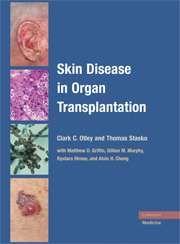Book contents
- Frontmatter
- Contents
- List of Contributors
- Foreword by Daniel R. Salomon
- Foreword by Robin Marks
- Foreword by Kathy Schwab
- Preface
- Acknowledgments
- SECTION ONE TRANSPLANT DERMATOLOGY: AN EVOLVING DYNAMIC FIELD
- Section Two Transplant Medicine and Dermatology
- Section Three Pathogenic Factors in Transplant Dermatology
- Section Four Cutaneous Effects of Immunosuppressive Medications
- Section Five Infectious Diseases of the Skin in Transplant Dermatology
- Section Six Benign and Inflammatory Skin Diseases in Transplant Dermatology
- Section Seven Cutaneous Oncology in Transplant Dermatology
- Section Eight Special Scenarios in Transplant Cutaneous Oncology
- Section Nine Educational, Organizational, and Research Efforts in Transplant Dermatology
- 48 Quality of Life Associated with Dermatologic Disease in Organ Transplant Recipients
- 49 Patient Education in Transplant Dermatology: Pre- and Post Transplant
- 50 Transplant Dermatology Clinics
- 51 Transplant Dermatology Organizations
- 52 Research Databases for Transplant Dermatology
- 53 Resources for Transplant Dermatology
- Index
52 - Research Databases for Transplant Dermatology
from Section Nine - Educational, Organizational, and Research Efforts in Transplant Dermatology
Published online by Cambridge University Press: 18 January 2010
- Frontmatter
- Contents
- List of Contributors
- Foreword by Daniel R. Salomon
- Foreword by Robin Marks
- Foreword by Kathy Schwab
- Preface
- Acknowledgments
- SECTION ONE TRANSPLANT DERMATOLOGY: AN EVOLVING DYNAMIC FIELD
- Section Two Transplant Medicine and Dermatology
- Section Three Pathogenic Factors in Transplant Dermatology
- Section Four Cutaneous Effects of Immunosuppressive Medications
- Section Five Infectious Diseases of the Skin in Transplant Dermatology
- Section Six Benign and Inflammatory Skin Diseases in Transplant Dermatology
- Section Seven Cutaneous Oncology in Transplant Dermatology
- Section Eight Special Scenarios in Transplant Cutaneous Oncology
- Section Nine Educational, Organizational, and Research Efforts in Transplant Dermatology
- 48 Quality of Life Associated with Dermatologic Disease in Organ Transplant Recipients
- 49 Patient Education in Transplant Dermatology: Pre- and Post Transplant
- 50 Transplant Dermatology Clinics
- 51 Transplant Dermatology Organizations
- 52 Research Databases for Transplant Dermatology
- 53 Resources for Transplant Dermatology
- Index
Summary
In patients who have undergone organ transplantation, understanding causal links between exposures (risk factors), such as immunosuppression and outcomes (disease states), such as certain cancers, is vitally important for prevention, treatment, and optimization of transplantation. The fields of epidemiology and biostatistics utilize different study designs, including descriptive analyses and exposure/outcome studies, (such as randomized trials, cohort studies, and case-control studies) for such analyses. All studies, regardless of design, rely on data. Although randomized trials involve prospective monitoring of two or more groups over time, most of our knowledge regarding disease causation comes from studies of retrospectively collected data. As such, one of the most powerful epidemiologic tools is found in the formation and continuation of well-designed databases.
In 1971, the U.S. congress passed the National Cancer Act. This act mandated physicians and hospitals to collect and publish data for the treatment and prevention of cancer. Since that time, further laws have been established for mandatory reporting of cancer incidence and data to a centralized national registry through the Surveillance, Epidemiology, and End Results (SEER) Program of the National Cancer Institute (NCI). SEER currently collects and publishes cancer incidence and survival data from population-based cancer registries covering approximately 26% of the U.S. population. Specific to organ transplant recipients (OTRs), the United Network of Organ Sharing (UNOS) is the organization that administers the nation's Organ Procurement and Transplantation Network (OPTN) and maintains the largest database and cancer registry for solid OTRs in the United States.
- Type
- Chapter
- Information
- Skin Disease in Organ Transplantation , pp. 331 - 335Publisher: Cambridge University PressPrint publication year: 2008



